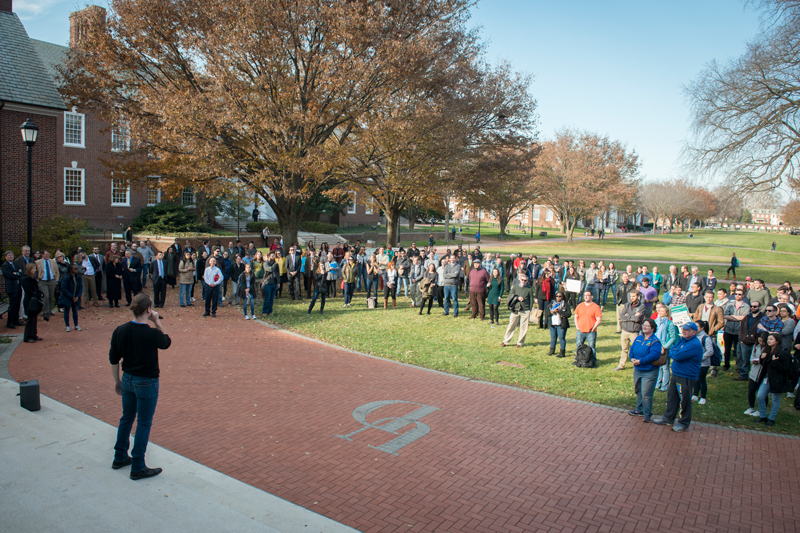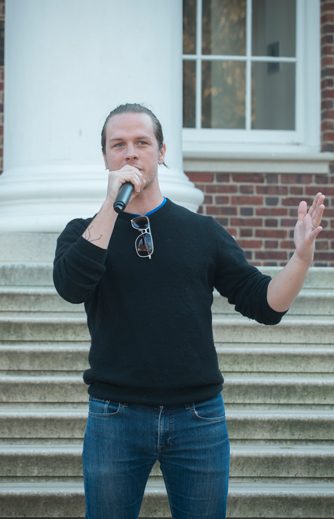


UD graduate students rally in opposition to federal tax proposal
Photo by Wenbo Fan December 01, 2017
U.S. House bill would increase taxes for some in higher education
The Graduate Student Government at the University of Delaware held a rally on Wednesday, Nov. 29 in front of Memorial Hall on campus to protest federal tax legislation that could hurt the method used by thousands of graduate students nationwide to pay for their education.
Dozens of UD students, faculty, staff and administrators attended the rally, which came as the U.S. Senate was considering its version of a new tax plan. On Nov. 16, the U.S. House of Representatives passed a bill which has several provisions that concern higher education groups. Among them, tuition waivers would have to be treated as taxable income. Many graduate students are only able to attend school because of tuition waivers.

Graduate Student Government President David Maisson told the crowd that research done by graduate students is not restricted to science and technology. He pointed out that English Department graduate students, as one example, often teach courses and mentor undergraduate students.
“The work that we are doing here at the University of Delaware and across the country is elemental to the progress of society,” Maisson said. “Elemental to innovation, elemental to research, elemental to be able to progress society. Without that, where are we?”
UD President Dennis Assanis said he has reached out to Delaware’s U.S. Congressional delegation - Senators Tom Carper and Chris Coons, and Representative Lisa Blunt Rochester - in hopes of helping them positively influence the final legislation. Assanis said the outreach includes trying to “build partnerships countrywide.”
“The country needs you,” Assanis said at the rally, referring to graduate students. “The world needs you. And more than that, our state right now needs you. Our state is in need of innovation and the innovation is going to come from the University of Delaware.
“Let me also make it clear that our University, just as the way we are committed to unparalleled graduate education, we also want an undergraduate experience second to none. And to do that we want to introduce all our undergraduate students to phenomenal role models, advisors, mentors, teachers, who are our graduate students, who are the ones guiding them to graduate research.”
The Senate tax plan, which passed early Saturday, Dec. 2, does not include the House provisions affecting tuition waivers. The House could vote to accept the Senate plan, or the House and Senate would have to negotiate to settle differences in the bills, before the final legislation is sent to President Trump for his consideration.
Many graduate students work for their universities as research or teaching assistants, in exchange for tuition waivers that greatly reduce the cost for them to attend school. The House plan would count the waived tuition costs as taxable income, which could double or triple the amount owed in taxes. Currently, students only pay taxes on the income they take home. Other employees of universities would also have to pay tax on tuition waivers.
Undergraduate resident assistants, who often receive free room and board, could also be subject to new taxes. Assanis also noted endowments to universities and scholarships may be subjected to taxation. How charitable donations are treated under a new tax law could also affect universities.
UD wants to expand its graduate student population and add faculty to teach them, with the possibility of eventually establishing a Graduate College. UD has 4,024 graduate students for the 2017-18 school year and Assanis said the number could nearly double in the next decade.
Charles Riordan, UD’s vice president for research, scholarship, and innovation, urged students to stay engaged and encouraged people to sign an online statement showing support for UD research initiatives.
“There is the unquestionable, inextricable link between graduate education and research,” Riordan said. “We can’t have one without the other and so investing in graduate education is fundamental to the mission of the University of Delaware and it's a scenario we are deeply committed to.”
Contact Us
Have a UDaily story idea?
Contact us at ocm@udel.edu
Members of the press
Contact us at 302-831-NEWS or visit the Media Relations website

